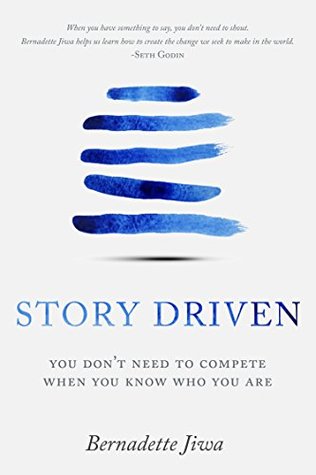More on this book
Community
Kindle Notes & Highlights
Every one of us—regardless
has been conditioned to compete to win.
Successful organisations and the people who create, build and lead them don’t feel the need to compete, because they know who they are and they’re not afraid to show us.
Story Driven gives you a framework to help you consistently articulate, live and lead with your story.
how to stop competing and start succeeding by being who you are, so you can do work you’re proud of and create the future you want to see.
what makes us unique.
important to have a powerful sense of identity
We have become reactive to the competitive landscape, rather than responsive to the needs of our communities—those people we hope to serve.
We are so focused
on the competition, or even the threat of it, that we’ve forgotten to double down on what makes us and...
This highlight has been truncated due to consecutive passage length restrictions.
an alternative—a way to discover (or rediscover) and stay true to who you are and to remain conscious of how your contribution can impact the world.
All change happens at the edges.
each of us gets to decide what we have to say and how we’re going to go about it.
She may not always get to choose the work, but how she does it is a choice.
you will be ready to go from understanding your value to deciding to tell and live your story, so that you can look back in two years’ or ten years’ time and be glad you did.
They had forgotten who they were.
what distinguishes each of these brands from the other is the business philosophies upon which they are built.
Tesla’s people have always been united around a single mission: ‘to accelerate the world’s transition to sustainable transport’.
Whether it’s articulated or not, every business is driven by one of two philosophies. A company is either competition-driven or story-driven.
The competition-driven company
the story-driven company is responsive to customers and prioritises having a clear sense of purpose and identity. It makes little reference to the competition and is intent on creating an impact.
They thrive by making the connection between their purpose and prosperity. Their goal is to make a difference.
Great companies have something in common: they don’t try to matter by winning. They win by mattering.
Great companies rise to our expectations by being who they said they would be.
Differentiation happens when you authentically amplify the best of you—discovering how to be more of who you are, rather than finding ways to be a version of the competition.
When we constantly pursue and prioritise ‘more’ above ‘meaning’, we take wrong turns, box ourselves in, self-sabotage or make unhelpful plans.
‘The critical question is not “How can I achieve?” but “What can I contribute?”’ —Jim Collins,
we often skip the important first step—of reflecting deeply about the reason our idea or project needs to exist and the change we’re trying to create.
Having ideas is fun. Understanding what makes them relevant today or significant tomorrow, and why you’re the person to move them forward, is work.
At the heart of every good idea or great business is a clear sense of purpose and a vision for the future its creator wants to see.
we are more likely to make progress when we believe in the significance of what we’re doing.
Our story illuminates the dark corners where only we can go. It’s our story that guides us.
the building of the Meaning Economy, where the brands and businesses that thrive are the ones that enable us to work with our hearts as well as our heads and hands.
Our work is also how we get a sense of fulfilment.
meaning’s ‘essential quality has to do with having a sense of purpose, value, and impact—of being involved in something bigger than the self’.
Putting contribution before profits is still an underrated business strategy.
These businesses don’t simply exist to turn a profit—they are contributing to your community, the wellbeing of their teams and the betterment of the world, sometimes indirectly.
‘Story’ is defined as ‘a narrative, either true or fictitious, in prose or verse, designed to interest, amuse, or instruct the hearer or reader’.
overlooking the opportunity to leverage them to help us see ourselves more clearly.
Our stories can shape who we are.
The foundation is who we are at birth and how we develop in early life—our traits.
The second layer is our goals and values—what we believe and strive for as we get older.
The final layer is our stories—what we choose to remember about our past and how we make it meani...
This highlight has been truncated due to consecutive passage length restrictions.
We make sense of who we are by piecing together stories from our reconstructed past, perceived present and imagined future.
Our customer is seen as someone who needs a guide on a quest.
The story-driven company thrives because its people have a collective narrative identity that gives them a sense of purpose and creates a cohesive culture.
every business idea starts from a place of wanting to contribute something.
neuroplasticity—how the brain can reorganise itself and form new connections—have
Our choices, as they accumulate over time, strengthen our personal narrative.
What classifies a decision as the right one depends on the outcomes we optimise our organisations to create.


